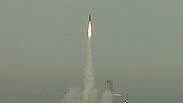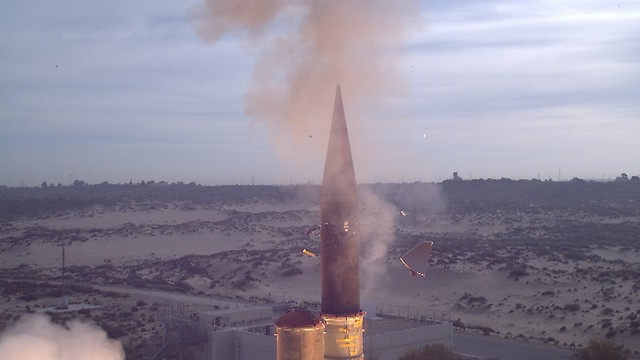
Israel preparing for new missile threats
Arrow 3 missile interceptor, still under development, seen as answer to threat of long-range Iranian Shahab-3 missiles.
The face of warfare is changing in the Middle East and future conflicts are more likely to involve missiles and less likely to use ground troops. Israel is preparing for these threats with a four-tier system.
“The Arrow 3, which we are currently developing, is the ultimate system,” said Uzi Rubin, the former director of Israel’s Missile Defense Organization. “It is perhaps the most advanced missile interceptor in the world. Other countries don’t even have something like this on their drawing boards.”
He said the greatest threat to Israel today comes from long-range Iranian Shahab-3 missiles which can be fired from deep inside Iran and fly some 1200 miles. The Arrow 3, which is being jointly developed with the United States, is designed to stop these long-range missiles. It is even designed to stop missiles in outer space before they reach Israel.
Arrow 3 in second flight test:
The Arrow is being developed by Israel Aircrafts Industries (IAI). Yoav Tourgeman, a general manager at IAI, says that once the Arrow 3 is developed, it will be a game changer.
“It is a very innovative atmospheric interceptor will enable us to almost seal our skies from attack from our neighbors,” he told The Media Line.
Related stories:
- Successful Arrow 3 missile interceptor trial carried out
- IDF delays additional Iron Dome deployment due to budget cuts
- Israel sees future drone threat from Hezbollah, Hamas
He said Israel has already twice tested the missile “flyout” and is currently preparing for an interception test. The expensive project has just received a new injection of funding from the US.
For shorter-range rockets there is the Iron Dome, which proved its effectiveness again this week as some 20 rockets were fired from Gaza at southern Israel. Iron Dome intercepted three of those rockets that were headed for populated areas. Islamic Jihad claimed responsibility and said it was in response to an Israeli air strike that killed three Islamic Jihad members earlier this week.
Until now, the main difference between rockets and missiles has been that rockets, which are usually shorter-range, do not have a guided system, while missiles do. That may now be changing.
“In recent years the line between the two categories has blurred,” Brig. Gen. Shlomo Brom, a long-time military intelligence official told The Media Line. “Guidance systems used to be very expensive. But with the development of GPS-systems, we are observing a new trend of installing guidance systems on rockets.”
That could make the 70,000 rockets that Hezbollah has in south Lebanon more dangerous in the event of a war. At the same time, the threat from Syria has decreased as Syrian President Bashar Assad remains mired in a three-year-old civil war. Syria has already used about half of its missile capability, Brom said.
'True face of Iran'
Israel has been working hard to try to stop Hezbollah and Hamas and Islamic Jihad in the Gaza Strip from obtaining new, more accurate missiles. Last week, the Israeli navy intercepted a ship near Sudan that was carrying Iranian missiles that were being transported to Gaza. Israeli officials said it showed both the “true face of Iran” and the fact that radical groups are preparing for another confrontation with Israel.
The experts were speaking at a missile defense conference organize by the Institute of National Security Studies (INSS) at Tel Aviv University and Israel Homeland Security Home (iHLS.) It included an exhibition of the latest missile defense systems. Several senior American officials addressed the conference.
One senior US official, Brigadier General John Shapland, the chief defense attaché for the US Embassy in Tel Aviv, suggested that Israel expand its missile defense umbrella to include its neighbors.
"If we were able to build a regional defense capability in, say, Jordan, that capability could easily defend Israel, Jordan and even Egypt, if you so desired, adding one more layer to your multi-layered defense," he told Israeli officials and experts gathered at the INSS think-tank.
Given the regional tensions these days, it does not seem likely, but Israeli officials did not dismiss the idea out of hand.
Article written by Linda Gradstein
Reprinted with permission from The Media Line











